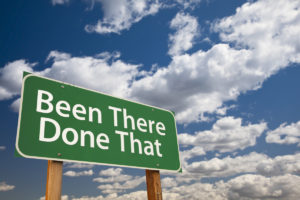
Gay Men’s Skills of Living Series: #2 – Making the Most of Your Past, Present, and Future
This is the second of a ten-part series that I call “The Gay Men’s Skills of Living Series”, based on what my clients at GayTherapyLA (my therapy and coaching practice that specializes in gay men, for the past 26 years) are talking about regarding the positive, practical, and empowering changes they want to make for themselves this year. The first article in this series, “Reclaiming Your Time”, was about time management. Today, I’d like to share about making the most of your past, present, and future.
Frankly, I think there is a right way and a wrong way most guys think about these. Too often, guys get demoralized because bad experiences in their past drag them down or burden them, so they undermine or even self-sabotage themselves in the present day, leaving them heading toward a future that carries far too many frustrations and likely disappointments.
The most common advice we hear about how to think these is almost cliché: to not live in the past, not live in the future, but to stay in the present, because the “present” is like a “gift”. That’s true, but I think using these ideas goes beyond this.
Making the most of your personal and professional potential, which is a huge part of how I help gay men in everyday practice, involves sharpening your perspective on your own relationship to your past/present/future. Old-school psychoanalytic psychotherapists would tend to focus on how events, even traumas, from your Family of Origin and developmental past influence your present-day problems and neuroses. And they’re not wrong, but today’s therapy/coaching client generally wants a present- or future-focus. Out of past or future, I kind of like “living for the future” more, because it means you’re constantly challenging yourself (in a good, exciting way) to set yourself up for continual growth in the years ahead, improving your quality of life by taking care of your professional goals, personal goals, and your health (mental and physical) for the long term. But too much focus on your future can cause anxiety, because you can worry about what will happen if things don’t turn out right. Plus, as John Lennon said, “Life is what happens to you while you’re busy making other plans.”

Making the Most of Your Past
While you can’t control your past because it’s already happened, you can reframe it in your mind and re-interpret the take-away messages to help your present. One recent client was frustrated in his late 20’s because he felt under-employed, both in terms of what he was doing (a menial job) and in how little he was earning. He reported that he had trouble having the self-esteem and self-confidence to go after his primary career interest because growing up, his parents were not encouraging, were actually discouraging, and he lived in the shadow of a high-achieving sibling (that his parents erroneously compared him to).
Through the course of our work, in my style that combines elements of both therapy and coaching, I helped him realize that although his upbringing was less than ideal, and his early influencers did not support his confidence, it was up to him in his present-day status as an independent adult to cultivate his own self-confidence by using the tools I teach in Cognitive Therapy that help someone overcome negative beliefs about themselves. I helped him reflect on his strengths, identify mentors and networking contacts to help him on his career plan, and set a plan to achieve his career goals gradually over time. We worked on revising his resume together, role-played job interviews, and identified areas where he needed to improve his skills (by seeking out classes, tutoring, or additional education), and developed a self-marketing plan to get him in contact with the people who could hire him in his chosen field. We discussed how just because something in your past put you at a disadvantage, that doesn’t mean that hardship needs to undermine you now. Empowering yourself in the present means that you take what was good from your past, and use those to fuel your strengths, but you also can let go of those things in the past that no longer serve you (such as losses, injustices, disappointments, resentments and regrets).
Self-reflection is an important part of this work. Understanding yourself, and developing self-insight, means critically thinking back and asking yourself what worked about your past, whether in your Family of Origin, or in your past as an adult (the time since high school or so). Think about the experiences you had, the lessons you learned, the interpersonal relationships you had, and whether these experiences made you wiser and stronger, or they hurt you in a way that you had to recover from (such as if you’ve had abusive parents, bad bosses, dysfunctional relationships, or traumatic events). As one of my favorite authors, Louise Hay, used to say, no matter what happens in your day, say to yourself, “How can I take a positive approach to this?” That helps set your mind in a healthy and empowered frame.
When I work with guys who had a reasonably good, even privileged past, I see how it helps their self-confidence as adults. We all wish we had great parents, great schools, great friends. But if you had a dysfunctional family growing up, or had traumatic events that influenced you, it’s important to understand that just because your past was messed up doesn’t mean that your present and your future have to be. Rather than focusing on how past bad events hurt you, try to think of the take-away lessons you learned from these experiences that make you stronger today, and how those can be a guide for what to do (or not do!) in the future. It’s when you say, “Note to Self: next time, do this instead of that.”

Making the Most of Your Present
Louise Hay also used to say in various books and lectures, “The point of power is in this moment,” meaning the present. What you think, say, and do, right now, is perhaps the most powerful thing that influences your life. If you’re trying to lose weight, the second your restaurant server says, “What’ll you have?”, you can answer “the salad special”, or you could say, “the triple cheeseburger” in the millisecond afterward. The first answer keeps you on your diet; the second one probably delays your weight loss goals. In that moment, you have power. And it’s that way multiplied times thousands of tiny moments in your day, week, month, and year that are the products of your thinking and behavior. Added up, that’s your life.
The present is where you have the most control. It is the tightrope balance between where you have been in your past, and where you are headed. I tend to help clients with short-term behavioral goals that help them move toward achieving their goals, week by week. I encourage them to say, “What you can you do now, today, or this week, that is a behavior that contributes to your goal?” If your goal is to get a new job, for example, the person might say, “I will contact three people to have networking meetings with.” And I’ll say, “Which three? When?”, and they say, “I’m trying for lunch with Karen on Wednesday, coffee with Laura on Thursday, and Happy Hour with Fernando on Friday.” When we are setting short-term, immediate-focus goals in the present (or very near future), as therapist/coach Casey Truffo, LMFT says, “The difference between dreaming, and doing, is scheduling”.
Just as I describe in my book, Self-Empowerment: Have the Life You Want, making the most of your past, present, and future means understanding how each of these is on its own, but they are inter-connected, even back-and-forth. You ask yourself how you can make the most of understanding each, in service to whatever quality of life goals you’re working on.

Making the Most of Your Future
I come from a family where, overall, people live a very long time. All four of my grandparents lived to be well over 90, and other relatives have lived at least this long (I have a (lesbian) great-aunt who is now 102, who once told me her greatest regret was that she never rode a motorcycle!”). Because of this, I’ve been interested in the concept of Healthy Aging, and seeing what thinking and behavior in either youth or middle age contributes to a particularly robust older life. Some of the ideas I’ve observed are exactly what you’d expect: relatives who took care of themselves physically, particularly with exercise, but also with diet, had the healthiest aging overall, and those who didn’t had the harder time of it. Another factor I noticed was self-care and stress management. And, a good sense of humor and not taking life too seriously probably was the biggest factor of all. Since most of my clients are young adult men, or middle-aged men, the idea of how to age well (mentally and physically) is often a bit theoretical, but I try to share what I’ve learned from my family, my education, and just by observing older friends, to guide them on what I’ve seen work well for the long haul.
Some of my clients struggle with anxiety, and a fear of the future about what might or might not happen is a common pitfall. As my clients in AA caution, “try not to live in the results.” You can have a goal, but being a slave to a certain fear of the future can undermine living in the present day. As the saying goes, no one is guaranteed tomorrow, and all we have to do is read the news to understand that lives can change or end in the blink of an eye. Rather than be anxious about this, we can say that we’re doing the best we can today in case we have a long future (getting good medical care, reasonably saving money, practicing stress reduction), but we will also “enjoy the journey” just in case, for whatever reason, we don’t live to be some old age.
The Importance of Self-Reflection
Reflect and think about these ideas for yourself. What is it about your past that bothers you? Do you have mental or emotional work to do to resolve something that lingers? Or your present: What is it about your current, everyday life that you would most like to change? What is it about your future that gives you the most worry or anxiety? I think it all starts with understanding that you are not passive or helpless in all this. You have the power to re-think, re-interpret, and re-focus all of these. If you have trouble doing it by yourself, that’s not a sign of your own weakness or inadequacy; it’s just a reminder that humans are social creatures who rely on one another. Independence is a great thing, but it’s also a bit of a myth. We live in a collective society, whether current politics emphasizes this or not. As gay men, we are part of an important and robust subculture, that has its challenges and its privileges, and issues about the past, present, and future are certainly important because the status of gay men in society is ever-evolving on a social/political level, that ultimately affects us on a personal/individual level. So if you need help making the most of understanding your past, empowering your present, and laying groundwork for a robust future, particularly in the context of gay men’s culture, consider coaching or therapy. Your point of power is in this moment.
(Text or call 310-339-5778 for more information on how to book therapy/coaching services, or email Ken@GayTherapyLA.com)


